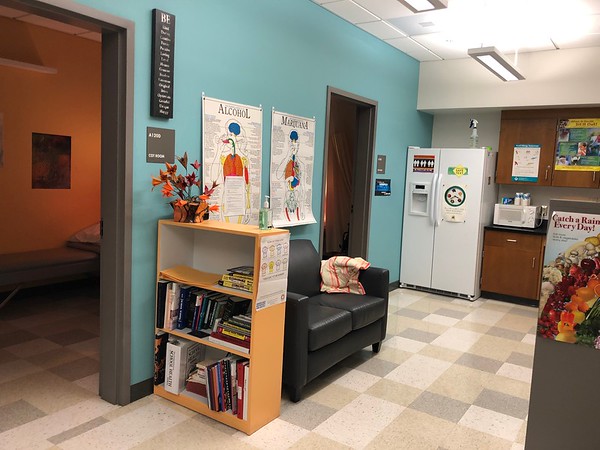Nurse Amy Schoeff offers flu season precautions

Credit: Ellie Tyska
Winter is known as the peak season for one of the most common viral infections; the flu. Students with the flu most likely experience high fevers, coughs, and runny noses. To help prevent the spread of this infection, many schools are giving the option to students of getting the flu shot at school. Nurse Amy Schoeff is available in the nurse’s office for any students in need of the flu shot. “If you haven’t been vaccinated yet, definitely come in. Paperwork is available on the WHS website,” Schoeff said.
January 7, 2019
As the winter season approaches and temperatures drop, the chances of the common cold become higher. To keep the school as healthy and safe as possible, school nurses are preparing for the flu season.
“[The flu season is most common] during January and February,” WHS nurse Amy Schoeff said. “It occurs year round, but the peak months are January and February.”
The flu is a common viral infection that attacks the lungs, nose, and throat. The virus is transmissible, whether it be through sharing a drink with a friend or not washing hands. In order to prevent the flu as much as possible, Schoeff takes extra precautions to create a safer environment.
“[I’m trying to create a safer environment] by informing people about how important it is to get vaccinated and stacking up on hand sanitizer,” Schoeff said.
Although Schoeff tries to educate students about the flu as much as possible, students can also take some steps to prevent this infection.
“Number one, get the vaccine,” Schoeff said. “Number two, wash your hands or use hand sanitizer not just before eating but before touching your face, mouth and eyes because those are all ways that you can get the virus into your body. Stay away from people who are sick.”
Even though the flu vaccine may have some flaws and not always be effective, Schoeff recommends that students should still get the vaccine.
“I have given [the flu shot] to a lot of staff, and I’m still giving it to kids,” Schoeff said. “I just picked up 20 more doses, so if people need it [who] haven’t been vaccinated yet, they should definitely come in. Paperwork is available on the WHS website.”
To help students avoid the flu, it is important for students to understand the symptoms of the flu in order to know when they have it.
“It comes on really hard and really fast,” Schoeff said. “When you have it, there’s no question that you have it. [Symptoms include] body aches, a fever around 103, headaches, sometimes vomiting and just overall feeling awful.”
Even with many methods of prevention, there is always the possibility of getting the flu. In any case where someone gets the flu, their the number one priority should be resting in order to prevent spreading the flu.
“[If you have the flu,] stay home,” Schoeff said. “Please, stay home. Basically, you’ve got to just make sure you stay hydrated, that you just get as much rest as you can, and you just have to get through it.”





![Last Wednesday, the Wayland School Committee gathered to discuss a number of topics regarding the health curriculum and Innovation Career Pathway course. Another large topic of conversation was the ways to potentially mitigate distracting cell phone usage. "These [phones] are going to distract your learning and social relationships," Superintendent David Fleishman said. "That's concrete right there."](https://waylandstudentpress.com/wp-content/uploads/2025/06/Screenshot-2025-06-04-at-9.49.31 PM-1200x886.png)



























![Troy Hoyt finishes the Boston Marathon, running for the Hoyt Foundation. T. Hoyt is the son of Hoyt Foundation CEO Russ Hoyt.
“[Running a marathon] might seem like a big thing, when it’s presented to you at first, but if you break it up and just keep telling yourself, “Yes, you can,” you can start chipping away at it. And before you know it, you’ll be running the whole 26 miles, and you won’t even think twice about it.” T. Hoyt said.](https://waylandstudentpress.com/wp-content/uploads/2025/04/C36E8761-1CBB-452E-9DF2-543EF7B1095E_1_105_c.jpeg)












































